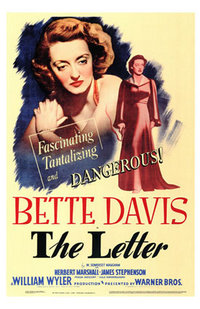The Letter (1940)
December 7, 2006
A hearty mix of work, school, and the holidays has obviously had an effect on the amount of time I can spend watching movies recently, which is why the blogging pace has slowed considerably these past few weeks. I did, however, have a chance to watch The Letter this past weekend. Although I had heard a few times of this 1940 Warner Brothers classic, I did not realize just how much this film had going for it until I saw the opening credits, which turned out to be a who’s who of 1940s-era Hollywood. Besides starring Bette Davis (always a good sign), it’s also directed by William Wyler and produced by Hal Wallis – each man at the top of their respective game at the time. I don’t typically keep up with producers, but with Wallis I make an exception – particularly during his Warner Brothers years (this probably is due in no small part to my  Bogart obsession and the fact that in the years to follow Wallis would produce such Bogie classics as High Sierra, The Maltese Falcon, and Casablanca). Even the music was scored by Max Steiner, one of the few composer names that I recognize and a perennial Academy Award nominee. From top to bottom, this had all the promise of being a quality production. Not surprisingly, it was.
Bogart obsession and the fact that in the years to follow Wallis would produce such Bogie classics as High Sierra, The Maltese Falcon, and Casablanca). Even the music was scored by Max Steiner, one of the few composer names that I recognize and a perennial Academy Award nominee. From top to bottom, this had all the promise of being a quality production. Not surprisingly, it was.
The Letter is based on a play by W. Somerset Maugham, a popular author source for film adaptations in the 30s and 40s. The film begins with Leslie Crosby (Davis) shooting a man in front of her house in Singapore, where her husband operates a rubber plantation. Leslie tells her tale, and it appears it will be a straightforward case of self-defense, but soon, a letter surfaces with potentially damning evidence. The decision is made to buy the letter and cover it up, but it will come at a great price – both financially and with the toll it takes on the relationships of those involved.
On a side note, this was coincidentally the second classic in a row we saw which featured Victor Sen Yung (best known as being Number Two Son in the 1930s Charlie Chan movies and Hop Sing from TV’s Bonanza) – the other being Across the Pacific. The latter film, it seemed, portrayed its Asian characters in a better light than The Letter did (a fact I found surprising considering that Pacific was released not long after Pearl Harbor). Indeed, the Asian characters in The Letter seem almost like Dickensian bad guys in their portrayal. Throughout the film, they are linked to and motivated by a shallow form of capitalism to such an extent that they seem almost like two-dimensional caricatures (at one point, Leslie describes seeing her lover’s Chinese wife and how she was adorned with so much gold that she had to turn away in disgust).
The film does not involve a lot of action and instead focuses primarily upon the internal struggles of the main characters. Some great dramatic performances and some even better directing keeps it fairly interesting though. All the same, while I would say this is a well done classic, I don’t think I would go so far as to describe it as great. To me, it was one of those where the whole is less than the sum of the parts. Even though everyone involved with the film did a great job, it just seemed that, put together, it lacked that magic quality you so often get with films from that time period. Of course, this film has its fans and I’m sure many would argue with me on this point, so it’s probably best to see it for yourself and form your own opinion. The individual performances alone will make it worth it.